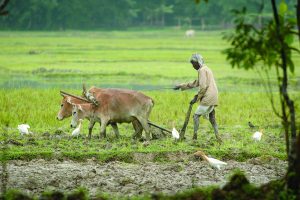
There are some puzzling questions pertaining to the recent hike in Minimum Support Price of Kharif crops set by the government. The important questions which every stakeholder of the agrarian sector has in their minds are: Is it a bona fide effort by the ruling government to mitigate the prevailing crisis in agriculture? Is the formula adopted to reckon the revised Minimum Support Price (MSP) of 14 crops based on the recommendations of MS Swaminathan Commission’s recommendations? Does the government have men and machinery to actually procure crops other than wheat and paddy? Do we actually have the scientific storage capacity to accommodate the crops classified under the revised price regime? Do the thanksgiving rallies organised by the political outfits and addressed by the Prime Minister Narendra Modi actually evince the sentiments of the farmers over the price hike of certain crops? Is the euphoria created over MSP hike real or designed? The list can be infinite. Nevertheless, the most perturbing question is whether MSP regime is relevant in the post-liberalisation era?
India opened the floodgates of economy in 1991 under the new liberalised policy and exposed farmers to international market. The Indian farmers, who were operating under a protective regime, were suddenly exposed to face more advanced, global players. Liberalisation of imports of commodities at a cheaper price pushed Indian farmer at an edge and his condition started deteriorating.
Lack of awareness, education and financial strength denied the farmers from accessing the benefits, if any, of opening up of Indian economy.
The languishing agrarian society had big hopes from the government elected in 16th Lok Sabha as there was a lot of impetus on worsening condition of farmers and implementation of Swaminathan Commission’s report prior to assuming power.
Post elections, Modi government left the farmers in the lurch and disgruntled farmers resorted to protests. It is again a political compulsion to harbour the favour of rural vote bank during the last leg of its tenure, that the government paid some heed on the MSP of crops. The revision in MSP may entail an additional burden of an estimated 33,500 cr on the exchequer; it has not been able to appease the farmers.
A large number of farmers; who are teetering on the brink of a debt trap find it as a short-term relief. But their problems are chronic and momentous and the Government lacks the intention to pull them out of the quagmire of distress.
Post MSP announcement, The NITI (National Institute for Transforming India) Ayog invited select farmers’ representatives to take their feedback on the proposal to engage Commission Agents on behalf of Government to procure the crops wherever there is a space constraint to store the crops. The farmer representatives disagreed. Talking to Tehelka, Bhupinder Singh Mann, Chairman, All India Kisan Coordination Committee said that there is an absolute callousness on the part of Niti Ayog. They want to put up political agents in the garb of procurement front man dole out funds in the name of storage expenses.
Mann added that depreciation is counted for in every production process. In agriculture, depreciation of land, micro-nutrients, depletion of underground water has not been considered by Dr Swaminathan. This is a blatant injustice to the farmers.
The brainstorming sessions of the farmers have been planned in the next month to mobilise the producers on the miscalculation of the remuneration of the crops so that political parties may not reap dividends over the false announcements in the upcoming Lok Sabha Elections, he informed.
In the state of Maharashtra, farmers look beyond MSP and find MSP as only a safety measure. Gunvant Patil Hangergar, a farmer based at Nanded in Maharashtra and Secretary of All India Kisan Coordination Committee told that time has come when the agriculture should be liberalised. “We want to have an open market price and operate in a free market. The government intervention does not solve the problem rather aggravates it. Our farmers start growing crops in expectation of assured return even if it disturbs the ecological balance and is a drain on our natural endowments. Water guzzling crops like paddy and sugarcane are not suitable for the states like Punjab, Haryana and Maharashtra but we them year-after-year. The volatility of price in crops other than paddy and sugarcane propels us towards these crops. If there is a glut in the market, prices crash due to over-supply and farmer is hit. Ironically, the farmer is a loser during scarcity too. If the crop fails due to a natural calamity and prices surge in the wake of supply constraint, the government intervenes and prices are suppressed. So, the farmer would lose in both the situation. Government procures close to 38 per cent of total paddy produced and the largest chunk of this is procured from the states of Punjab, Haryana and Western Uttar Pradesh” said Patil.
He added that the MSP of Cotton has been revised from 4,150 per quintal to approximately 4600 per quintal for Kharif Marketing season 2018.
This is approximately 12 per cent revision over last year. This is far below the estimated cost of 7225 per quintal of cotton cultivation calculated by the Agriculture Universities.
Maharashtra farmers are unhappy and will take the feedback of the ffarmers and decide the future course of action.
Farmers in Maharashtra have been groping in the dark to deposit the premium of Pradhan Mantri Fasal Bima Yojna. While the deadline for premium is July 31, servers are down across the state for the past many days. Making the procedures on-line have increased the hardships of the farmers as most of them do not understand this and totally dependent on whatever information is provided to them.
Even in so-called affluent states of Punjab and Haryana- hailed as the backbone of procurement system-farmers are dissatisfied over the MSP hike. Guni Prakash, a farmer leader from Haryana is a worried lot for diesel prices have shot up. A revision of about 200 per quintal in the MSP of paddy would be absorbed by spiralling cost of diesel and labour, he tells. Farmers in Punjab and Haryana pay high lease cost (30,000 – 50,000 per acre) which has not been incorporated in MSP.
While farmers have their own concerns over the fair price of crop, Economists assess the present situation as precarious where the politics has overshadowed economics. Professor Satish Verma, RBI Chair Professor at Centre for Research in Industrial and Rural Development, Chandigarh analysed that Agriculture is a double-edged sword that mostly works against the farmers. He observes that farmers earn lower returns if there is excess production during a particular season. Farmer is again in the eye of the storm if production falls due to a natural calamity. The Government would release the accumulated stocks of the agricultural commodities and augment domestic supplies by imports from abroad to dampen the inflated prices of these commodities. Moreover, farmers get merely a fraction of the price paid by the consumers for their produce, while the lion’s share is appropriated by the middlemen; thereby causing farmers to suffer regressive income distribution.
Farmers are used merely as a vote bank as we observe the trend that debt relief and price hikes are announced before elections. Economics does not support doles. But economics has taken a back seat. There is an urgent need to ramp up public investment in farming and take measures to raise the productivity. The exhilaration over MSP revision is short-lived and farmers need a sustainable solution to wade through the agriculture crisis.
The state of affairs in the largest producing state of India-Uttar Pradesh- is miserable as farmers mostly engage in to distress selling. Ajay Anmol, the Convenor of Kisan Andolan in Uttar Pradesh told that farmer of this state is a dejected lot for he has not experienced the MSP procurement system. “A higher or lower MSP is irrelevant for farmers if they are not entitled to it. The dynamics of agriculture are such that the more we produce the less we earn and the less we produce, the less we earn. Even a single crop loss pushes the small and marginal farmers into a debt trap and it takes years and generations to repay”.
He added that India is predominantly an agricultural country and we do not have an agriculture policy. It is imperative to frame an agriculture policy to guarantee our farmers a profitable income. MSP needs to be revised to match the inflation but at the same time, infrastructure support for the farming sector also needs to be stimulated.
One of the reasons for less procurement in states other than Punjab and Haryana is the lack of awareness. He apprised that they are mobilizing the farmers in Uttar Pradesh about the MSP mechanism and inform them to come forward for higher price.
Land acquisition under Section 17 by Government in the last few years in Uttar Pradesh is another issue that has undermined farmers’ income. Land acquired has not been put to a productive use. Farmers in Uttar Pradesh are fighting against the misuse of Section 17 and demanding the ownership back. Prime Minister Modi said he should give a chance to the farmers for direction interactions as he does with industrialists. There are a plethora of issues; a meagre increment, per se, in few crops cannot turn the tide.
According to All India Kisan Sangharsh Coordination Committee (AIKSCC), an outfit comprising of 200 farmers’ organisations across India, the Central Government which promised the farmers 50per cent prifit on comprehensive cost (C2) as mentioned in Swaminathan Commission’s Report, has betrayed the farmers by adopting the same formula of A2+FL by which the UPA Government under the Prime Minister Manmohan Singh fixed the MSP for crops. It held a protest march from Mandi House to Parliamentary Street on 20 July terming MSP of Modi as a fraud.
MSP hike announced by the Government does not meet the farmers’ expectations. While PM Modi claims that he has fulfilled his poll promise, there is no guarantee of remunerative minimum support price. After the announcement, the real challenge is in implementation. The major constraint faced by the farmers during the procurement process is Fair Average Quality of Crops, which is difficult to maintain. Furthermore, malpractices in the issue of the certificate by agents to farmers and selling it under MSP in the name of farmers make the ground level implementation of such proposals extraneous.
letters@tehelka.com












